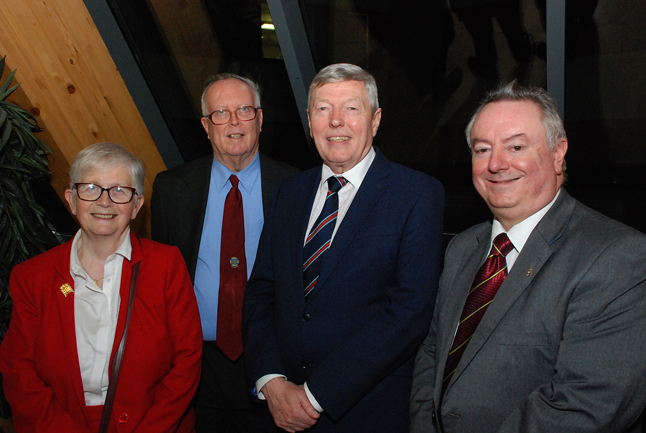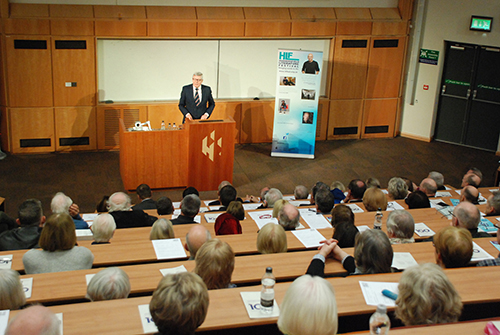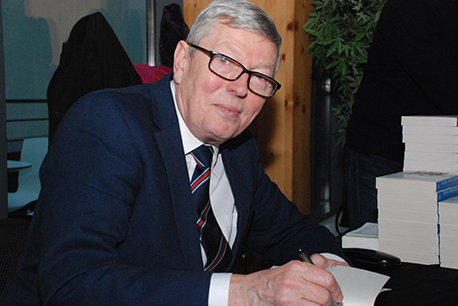Former Labour front bencher gives 2016 Harold Wilson Lecture
 Pictured with Alan Johnson MP (2nd right) are (l-r) Joy Crispin-Wilson, Professor Robin Wilson and the University Vice-Chancellor, Professor Bob Cryan
Pictured with Alan Johnson MP (2nd right) are (l-r) Joy Crispin-Wilson, Professor Robin Wilson and the University Vice-Chancellor, Professor Bob Cryan
Tue, 15 Mar 2016 08:49:00 GMT
Labour MP pro-Europe campaigner Alan Johnson draws comparisons between the current referendum and the previous 1975 referendum under PM Harold Wilson in annual lecture
 WHEN he delivered a showcase lecture at the University of Huddersfield, former Labour Cabinet minister Alan Johnson MP used the life and politics of ex-Premier Harold Wilson to bolster his party’s current campaign for saying ‘Yes’ to remaining in the European Union.
WHEN he delivered a showcase lecture at the University of Huddersfield, former Labour Cabinet minister Alan Johnson MP used the life and politics of ex-Premier Harold Wilson to bolster his party’s current campaign for saying ‘Yes’ to remaining in the European Union.
Although the late Lord Wilson – who was born in Huddersfield 100 years ago – was a reluctant convert to the European cause, he came to see it is a vital for security and social progress, argued Mr Johnson, who chairs Labour’s pro-EU campaign for the referendum to be held in June.
“I know how Harold Wilson would have voted,” said Mr Johnson. “He may have been a reluctant European but he was never a narrow nationalist. He would have continued to see the EU as the best framework for the lasting social improvements he cared about and which he did so much to deliver.”
The University of Huddersfield is the venue for the long-established Harold Wilson Lecture, delivered annually by leading politicians and public figures. Mr Johnson, whose past offices include Home Secretary and Health Secretary, drew a packed audience for the Centenary edition of the lecture, which was the culmination of a day of events to commemorate the man who, as Labour leader, won General Elections in 1964, 1966 and 1974.
Mr Johnson is also an acclaimed author of memoirs describing his impoverished London boyhood and early life as a postman, and he began his Harold Wilson Lecture by contrasting the racist, homophobic and sexist attitudes of the 1950s with the progress made when Harold Wilson led a government that “made the 1960s synonymous with social progress” – such as the abolition of the death penalty, race relations legislation and the legalisation of abortion.
“Harold Wilson gets too little credit for the changes that he presided over,” said Mr Johnson.
“I refute any suggestion that he was a reluctant social reformer. But he was a reluctant European.”
 Initially, said Mr Johnson, Harold Wilson felt a stronger sense of attachment to Britain’s Commonwealth and former Dominions. But disillusion set in after Rhodesia’s Unilateral Declaration of Independence in 1965 and he became a gradual convert to the European Community. He would have taken Britain in, had he won the 1970 election. Instead it was Tory PM Edward Heath who signed up to Europe and in Opposition a fractious Labour Party became increasingly anti-EC, with the Left seeing it as a “capitalist club”.
Initially, said Mr Johnson, Harold Wilson felt a stronger sense of attachment to Britain’s Commonwealth and former Dominions. But disillusion set in after Rhodesia’s Unilateral Declaration of Independence in 1965 and he became a gradual convert to the European Community. He would have taken Britain in, had he won the 1970 election. Instead it was Tory PM Edward Heath who signed up to Europe and in Opposition a fractious Labour Party became increasingly anti-EC, with the Left seeing it as a “capitalist club”.
The need to preserve unity was the essence of Harold Wilson’s approach to party politics, said Mr Johnson. When he became PM again in 1974, he saw a referendum as the best way to keep Labour together as a political force and for legitimising Britain’s membership of the EC.
A referendum took place in 1975, with campaign groups for Yes and No sending out massive amounts of literature. “I was a postman at the time and I felt the weight of the arguments on my back!” said Mr Johnson.
“I voted ‘Yes’ in 1975, for my young children’s future, and I have never regretted my decision,” he told the audience.
Harold Wilson sought party unity but he also saw EC membership as offering the best prospects for Britain’s success in a fast-changing world, where it needed friends. The pro-European arguments that Wilson successfully advanced are remarkably salient today, continued Mr Johnson, who pointed out the “incredible” parallels between 1975 and 2016, with current PM David Cameron also facing a rupture in his party.
Lecture celebrates centenary of Wilson’s birth
► In this video, Alan Johnson MP, talks about Britain staying in the EU and the legacy of former Prime Minister Harold Wilson.
The 2016 Harold Wilson Lecture took place in the presence by the ex-PM’s son, Professor Robin Wilson, accompanied by his wife and daughters, who attended a sequence of Centenary events co-ordinated by the University of Huddersfield. Members of the lecture audience were presented with copies of a special commemorative booklet about Harold’s life and achievements, compiled by the University of Huddersfield’s Professor of Politics, Brendan Evans.
The lecture was introduced by the Vice-Chancellor of the University, Professor Bob Cryan. He sent his best wishes to Harold Wilson’s widow, Lady Mary, who has now passed her hundredth birthday.
“As a University, we are fully determined to keep alive the legacy of Harold Wilson as a local lad who made full use of the opportunities provided by his early education in Huddersfield, and who transcended the social and economic difficulties that he and his family encountered. He went on to become a brilliantly successful economist, politician, party leader and Prime Minister,” said Professor Cryan.
“If Harold was one of the very best leaders that the Labour Party ever had, many might argue that our speaker tonight, Alan Johnson, is the best leader that the party never had!” he added.
The lecture was co-organised by Huddersfield Literature Festival and by the Huddersfield Episcopal Area of the Diocese of West Yorkshire and the Dales. Its Bishop, Rt Revd Jonathan Gibbs, gave a speech of thanks at the conclusion of the event.







